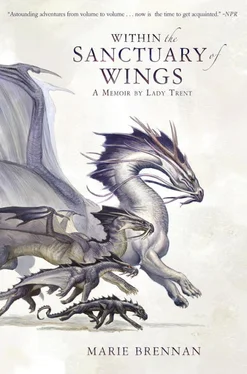Had the night not been so bitter, I suspect Ruzt would have sent me in the opposite direction from the one she chose—but her brain was not working as swiftly as usual.
I headed up a small ridge, thinking it would give me a good vantage point from which to survey the area. It is a mark of what effect the Mrtyahaima has on a person that I thought of the ridge as “small”; at home it would have been a good stiff hike. I shambled up it like an automaton, hunched in on myself against the cold, until I neared the ridge’s crest. There the morning sunlight found me, and I opened up like a timid flower, uncurling the tiniest bit to see if it was safe.
Earlier in this text I said that my awareness of how my Draconean companions suffered in the cold was one of the things that kept me from sinking entirely into my own misery and self-pity. The sight that greeted me atop that ridge was another.
Throughout the Mrtyahaima there are stories of a secluded mountain paradise. The nature of this paradise varies from place to place; in some regions it is the abode of the gods, in others it is the afterlife, and in some—though I did not know this until later—it is the bastion of some lost, idyllic civilization. I will not claim the Sanctuary was a paradise in the true sense of the word, and certainly it was neither divine nor idyllic… but its beauty I cannot deny. And from my vantage point I could take it in, from the encircling ring of mountains to the peak of Anshakkar towering above me, from the stony cliffs to the river that vanished into a steep-sided gorge, from the snow-coated trees to the flatter areas I suspected would be fields after the thaw. It was a wonderland of ice and snow, and so sublime was the vista that I forgot, for a few blessed moments, how cold I was.
What recalled me to myself was the realization that I was standing like some kind of brave explorer posing for her portrait—and that, in so doing, I had made myself quite visible atop that ridge. Even if there were no Draconeans nearby save Ruzt, this was not the wisest thing I could have done, and I hastily crouched to reduce my profile.
The shift in posture made me notice something else. The way up to the ridge had been a real scramble in places, but that was because I had chosen to take the most direct route to its top, rather than circling around to come at it from a lower point. Had I done so, the way would have been remarkably easy: the crest of the ridge was broad enough for at least five people to walk abreast, and quite flat.
Suspiciously so. It was too heavily shrouded in snow for me to examine its surface, but the manner in which it rose from the valley floor looked a great deal like a road.
And a road, of course, must lead somewhere.
As if I were a puppet and Curiosity herself pulling my strings, I turned to look in the other direction, up the slopes of Anshakkar.
There could be no doubt. It was a road, rising along a ramp either natural or Draconean-made; and although I could not properly see its end, something about the shape of the mountainside up ahead struck me as less than entirely natural.
I cast a quick glance about. Ruzt was not in sight, having gone in the other direction around that particular flank of Anshakkar; in the distance I could see smoke from one of the villages we had passed, but no one moving about. Inconveniently, no yaks had made their way up the road, which might have given me an excuse—
—but there were some yaks grazing not far off, on the other side of the road.
Wrestling one of the cows away from her herd and up the road was not so easily done, but I persevered. I knew, of course, that I should likely not be climbing Anshakkar to see what was there. If Ruzt wanted me to know, she would have brought me there herself. But the joy of discovery was my sustenance, when everything else in my life had been taken from me; and I did not have it in me to turn around and walk away. This way, at least, if anyone asked why I had gone there, I could say truthfully (if incompletely) that I was following a yak.
The beast finally received my messages and trudged up the road. The path was steep, but not arduously so, curving through a series of lacets that snaked their way up the mountain’s face. I could see my destination long before I reached it, but only in tantalizing glimpses of some monumental entrance, its lower parts blocked from view by the remainder of my route. Above that I thought I glimpsed something else, but it was even more difficult to see.
My wind had improved greatly since I first woke up in the sisters’ house, as had my injured leg. When at last I reached the road’s end, I was breathing hard, but not gasping. If my breath faltered, it was for the sight in front of me, and no physical weakness on my part.
The entrance carved into the mountainside looked like it belonged to the ancient world—and yet not quite. I could see the heritage of the Draconeans in the flaring, leaf-like capitals of the pillars which flanked the doors, but their bases were much wider than those I had seen elsewhere in the world, and no inscriptions marked their sides. The lintel above would have borne an intricate frieze if this place were in the Labyrinth of Drakes; here it showed only an abstract, geometric pattern, akin to those I had seen on pots and wooden implements in Imsali. And the doors—well, it is unfair to say how the doors compared, for the only surviving doors from ancient times I had ever seen were those in the Watchers’ Heart. But these were heavy and bound with corroded bronze, as if to hold out winter’s presence.
Had it been necessary to swing open one of those enormous portals, I would never have gone inside. The snow blanketing the flat, courtyard-like area in front of the doors was not terribly thick, on account of the continual wind, but it was still enough to hamper the swing of a door; and these were large enough that I would have had difficulty moving one even at the height of summer. But set into one of the doors was a smaller gate, such as one often sees in the main entrances of large Anthiopean tabernacles, through which an individual can pass without troubling to open the entire thing. And when I put my hand to this little door, it shifted.
Whatever this place was, I knew I should not be there. If anyone caught me, I might find myself in a great deal of well-deserved trouble.
But I had not forgotten the day I drew pictures on the wall of the yak barn. Kahhe, I thought, had suggested bringing me here, or at least telling me about this place; she had nodded her head in the direction of Anshakkar, and the mere suggestion had enraged Zam. I could only guess at what Kahhe thought to achieve—but knowledge was power, and right now I sadly lacked that resource. Sooner or later my life here would change, and if I went into that transition blind, I did not like my chances. However much I trusted Ruzt and her sisters, I did not want to leave myself wholly at their mercy.
I looked at the yak, who was ambling around nosing into the snow, as if wondering why I had brought her to a place with no grass. “No one will believe I chased you inside,” I said to her. She flicked one disinterested ear. “But I am not willing to relinquish you, either. Therefore, you will have to stay out here.”
There were five posts in the forecourt, whose purpose was no doubt ritual in some way or another. I tethered the yak to one of these. Then, before I could let myself think the better of it, I hauled the door open far enough to admit me and slipped inside.
The temple—A discovery upstairs—Exploration—The trespasser found—Images of the past—Nowhere to run
The interior was quite dim, but not wholly dark. Several unglazed openings above the entrance admitted both light and a small quantity of snow to the chamber beyond. These gave enough illumination for me to identify freestanding braziers around the edges of the room, with small objects set on shelves built between the legs of the braziers. When I bent to examine one of these, I found it was a lamp—much like those I had been using these past two months, but more finely made. The yak butter within was solidified, but kindling sat in the brazier above, bone dry. It was the work of a mere moment to light the brazier, and then I held one of the lamps above it to warm while I looked at my surroundings.
Читать дальше












